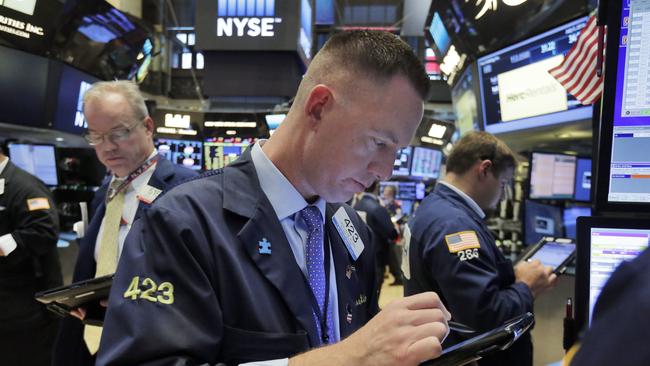Wall Street bounces on bargain hunting
Wall Street investors hunted for bargains, but gold rose as Brexit-fuelled uncertainty weighed on Europe.

US stocks rose overnight (AEST), nearly recovering from Tuesday’s retreat, as the most beaten-down sectors in recent weeks logged the biggest gains.
But bourses across the Atlantic swooned as investors sought safety as the fallout from Britain’s vote to leave the EU continues. The British pound plumbed a fresh 31-year low, while demand for gold sent the metal to a two-year high.
Another two British property funds suspended withdrawals after a sharp increase in investors seeking to pull their money out, which sent shivers through markets.
But the Australian share market could be set to shrug off the European gloom and follow Wall Street into the green, with ASX futures 33 points higher at 6.20am (AEST).
Investors last month fled sectors that are often considered riskier, including health care and technology companies, in favour of companies that provide steady returns, such as utilities and telecommunications companies, which are often considered to be bond proxies.
After opening slightly lower Wednesday, US stocks gained throughout the day. The Dow Jones Industrial Average rose 78 points, or 0.4 per cent, to 17919. The S & P 500 added 0.5 per cent, and the Nasdaq Composite rose 0.8 per cent.
Health care was the best-performing sector in the S & P 500, rising 1.2 per cent, led by biotechnology companies. The Nasdaq Biotechnology Index rose 2.3 per cent.
US biotech firm Medivation added 0.9 per cent after saying late Tuesday that it had signed confidentiality agreements with several suitors, opening the door to potential takeover talks.
The June reading on US service-sector activity also helped lift the S & P 500, as some analysts and traders viewed it as a fresh sign that the US economy is on solid ground. The Institute for Supply Management’s non-manufacturing purchasing managers index rose in June to its highest reading since November, a turnaround from earlier in the year.
“This is basically telling you that the US economy, while slow, remains vibrant,” said Jonathan Golub, chief equity strategist at RBC Capital Markets. However, “it doesn’t mean we’re off to the races either, “ he added.
Stocks held steady after minutes from the Federal Reserve’s June meeting revealed a split among officials about the health of the economy and how to proceed on interest rate decisions.
Indeed, in the Fed minutes, officials at the June meeting sparred over the health of the labour market, the outlook for growth and whether inflation is picking up. They agreed that it was “prudent to wait” for additional economic data before deciding when to raise interest rates.
The next big economic data point will come Friday in the form of the June jobs report. Many investors are hoping for a solid reading that suggests May’s lacklustre report, which was the weakest since 2010, was just a blip.
Elsewhere around the globe, stocks extended losses Wednesday and government bond yields in the UK and Japan hit record lows as economic concerns overseas added to investor worries ahead of Friday’s jobs report.
The benchmark 10-year Treasury note touched a fresh low of 1.321 per cent before turning higher. The yield on the 10-year note ended the day at 1.385 per cent, up from 1.367 per cent on Tuesday.
The Stoxx Europe 600 fell 1.7 per cent. The UK’s FTSE 100 fell 1.3 per cent, France’s CAC 40 lost 1.9 per cent and Germany’s DAX 30 lost 1.7 per cent.
Recent falls in European bank shares and a spate of UK property fund suspensions have exacerbated uncertainty following Britain’s June 23 referendum, puncturing a fragile recovery in risky assets such as stocksand oil.
US crude oil rose 1.8 per cent to $US47.43 a barrel on Wednesday.
As investors sought havens, the yield on Japan’s 20-year government bond fell below zero for the first time ever. Yields move inversely to prices.
Gold climbed to a two-year high, rising 0.6 per cent to $US1,364.80 an ounce.
Meanwhile, in Europe, “My focus is on the banks,” said Hani Redha, portfolio manager at PineBridge Investments.
British asset managers blocking investors from pulling money out of real-estate funds “are one piece out of a whole mosaic of very disturbing data points that will start coming in,” around the UK, he said, but banks in Europe aren’t particularly exposed to these funds, and it is primarily the financial sector that has potential for contagion.
In other currencies, China’s authorities guided the yuan to its weakest level in almost six years. The yen, which tends to gain in times of market stress, rose to its highest level against the pound since the referendum. The dollar was last up 0.1 per cent against the yen at Yen101.3940.
The stronger yen dragged down stocks in Japan while stocks in Australia and Hong Kong also finished with losses.
The Shanghai Composite Index, however, advanced 0.4 per cent.
Dow Jones






